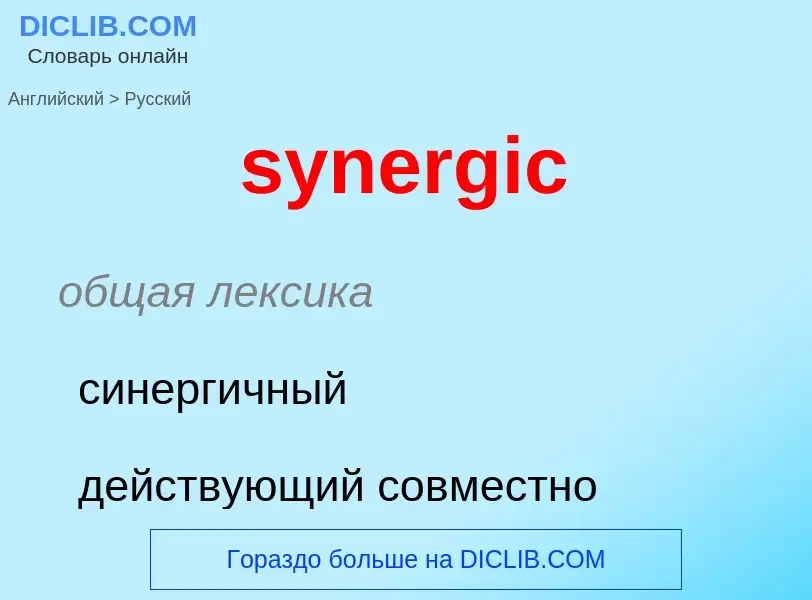Tradução e análise de palavras por inteligência artificial ChatGPT
Nesta página você pode obter uma análise detalhada de uma palavra ou frase, produzida usando a melhor tecnologia de inteligência artificial até o momento:
- como a palavra é usada
- frequência de uso
- é usado com mais frequência na fala oral ou escrita
- opções de tradução de palavras
- exemplos de uso (várias frases com tradução)
- etimologia
synergic - tradução para russo
общая лексика
синергичный
действующий совместно
синергетический
синоним
['sinədʒi]
общая лексика
синергия
существительное
медицина
синергия
синергизм
книжное выражение
совместные усилия
совместная деятельность
Definição
Wikipédia
Synergy is an interaction or cooperation giving rise to a whole that is greater than the simple sum of its parts. The term synergy comes from the Attic Greek word συνεργία synergia from synergos, συνεργός, meaning "working together".
Synergy refers to the combined effect of different elements working together to produce results unachievable by individual elements. In Christian theology, it implies a cooperation between divine grace and human freedom for salvation. The term has applications in various fields, including physiology, social psychology, and organizational behavior. In groups, synergy allows for better overall performance than if each member worked individually. However, group cohesion can lead to negative consequences, such as groupthink and risky decision-making. Synergy has been refined and further analyzed by R. Buckminster Fuller, who coined the term "synergetics." Information theory offers mathematical formalizations of synergy, though there is no universal agreement on its quantification.
The Synergism Hypothesis proposes that synergistic effects drive the evolution of complexity in living systems by fostering cooperative relationships at all levels. Synergy is observed in various contexts, such as pest synergy, drug synergy, toxicological synergy, and human synergy. In pest synergy, the combined effect of two parasites may lead to greater losses than expected. Drug synergy refers to the enhanced effects of drugs when used together, resulting from various mechanisms. Toxicological synergy is concerned with the combined risks of chemicals that may be individually safe but harmful in combination. Human synergy relates to teamwork and collaboration, leading to improved outcomes in various scenarios. Corporate synergy, a financial benefit realized through mergers and acquisitions, can manifest in marketing, revenue, financial, management, and cost aspects.
The synergistic action in the economy refers to the collaboration and coordination among economic players, leading to increased competitiveness, strategy, and network identity. The Synergistic Gravity Equation (SYNGEq) represents a synthesis of endogenous and exogenous factors that influence the decision-making of private and non-private economic actors within their networks. Synergistic networks can be divided into horizontal and vertical networks, with synergy effects providing benefits that are hard to imitate or reproduce. The concept of synergy, originating from the Greek word "synergos," has evolved over time and is now applied in various fields, including media economics and information theory. In media, synergy allows for the efficient promotion and sale of products through media conglomerates, while in information theory, synergy occurs when multiple sources of information together provide more value than the sum of their individual contributions.

